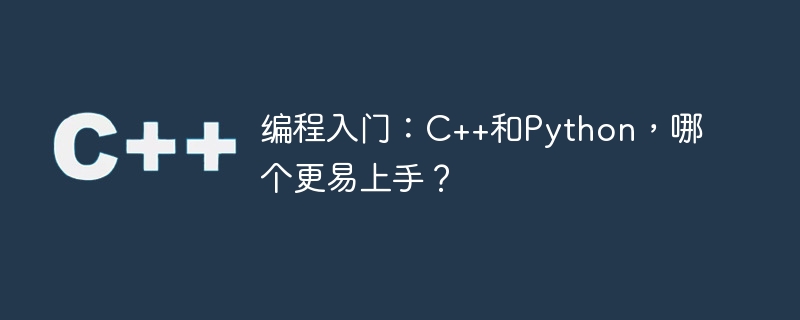Home >Backend Development >C++ >Getting Started with Programming: C++ or Python, which one is easier to get started with?

Introduction to Programming: C or Python, which one is easier to get started with?
With the continuous development of computer technology, programming has become a skill of great value and importance. When choosing their first programming language, many beginners will face a difficult problem: Which one is easier to learn, C or Python? This article will compare from many aspects to help beginners choose a programming language that suits them.
1. Introduction to C
C is a general programming language that is widely used in system software, game development and other fields. C is an object-oriented language with complex syntax and requires high logical thinking skills. The following is a simple C code example:
#include <iostream>
using namespace std;
int main() {
cout << "Hello, World!" << endl;
return 0;
}2. Introduction to Python
Python is a high-level programming language, known as the representative of "interpreted language". Python syntax is concise and easy to understand, suitable for beginners to get started quickly. The following is a simple Python code example:
print("Hello, World!")3. Ease of use comparison
4. Case Analysis
Suppose we need to write a simple calculator program. The following is the code implemented in Python and C respectively:
Python:
def calculator(a, b, operator):
if operator == '+':
return a + b
elif operator == '-':
return a - b
elif operator == '*':
return a * b
elif operator == '/':
return a / b
else:
return "Invalid operator"
result = calculator(10, 5, '+')
print(result)C:
#include <iostream>
using namespace std;
float calculator(float a, float b, char op) {
switch(op) {
case '+':
return a + b;
case '-':
return a - b;
case '*':
return a * b;
case '/':
return a / b;
default:
return -1;
}
}
int main() {
float result = calculator(10, 5, '+');
cout << result << endl;
return 0;
}As can be seen from the above cases, Python code is more concise and intuitive, while C The code contains more complex syntax and concepts.
Summary:
For beginners in programming, Python is easier to get started. Its concise syntax and rich library functions allow beginners to get started quickly and achieve results. In contrast, C requires more time and effort to understand its complex syntax and concepts, and beginners may feel confused and frustrated.
Therefore, it is recommended that beginners choose Python as their first language when getting started in programming, and then consider learning other languages such as C after they have mastered basic programming concepts and skills. I hope this article can be helpful to beginners who are choosing a programming language.
The above is the detailed content of Getting Started with Programming: C++ or Python, which one is easier to get started with?. For more information, please follow other related articles on the PHP Chinese website!